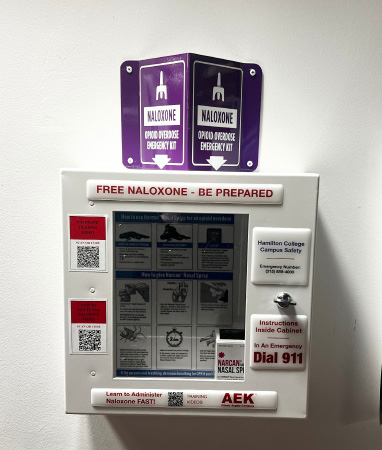
In a campus-wide email sent out March 25, Director of Community Health Promotion, Katie Cowen, and Associate Vice President for Student, Jeff Landry, informed the College that naloxone, more commonly known as Narcan®, will be available in all residence halls.
When asked about the benefits of having Narcan® available to students, Cowen stated that “I am hopeful that this initiative will help to increase awareness of naloxone as a resource, as well as a greater understanding of how and when to use it. Students can take a look at the online training video or sign up to attend in-person trainings as they are available. The SGA Health Committee has been a real partner in supporting these efforts. Beyond benefiting the campus community, I’m hopeful that students will take this education and carry it with them to be able to help another in an emergency, just like CPR training.”
Cowen also reflected, “I continue to be in awe of how this campus community seeks to support each other. When I’ve talked to students, staff and faculty about this initiative, there has overwhelmingly been a response of wanting to learn more or participate in training in service of one day helping someone in need. It’s lovely to be a small part of this.”
Narcan® is a life-saving drug that can reverse the effects of an opioid overdose. The drug is administered by placing the tip of the nozzle into a nostril and spraying the dose of Narcan®.
The signs of an opioid overdose are slow or no breathing at all, making gurgling noises, blue/gray colored lips and unresponsiveness. Narcan® should be administered immediately if the person is not responsive to stimulation, such as shaking. Narcan® wears off after 30–90 minutes so it is imperative that additional medical aid is given. Following administering Narcan®, one should call Hamilton College’s Emergency Medical Services (HCEMS) and Campus Safety officers at 315–859–4000 for additional support.
It is important to recognize that those who administer Narcan® will not face legal ramifications for being around opioids because of the Good Samaritan Law and Medical Amnesty policy that is in place at Hamilton. Campus community members can also request free fentanyl and xylazine test strips through the mail. More information can be found on the Health Center’s website under the “Naloxone (Narcan®) Availability” section.
Aliana Potter ’24, a Health Promotion intern at the Johnson Center for Health and Wellness, said “there was clearly significant interest in the training from all parts of the campus. It’s definitely a great step in improving student safety to have these trainings and to have easy access to Narcan®.”
















